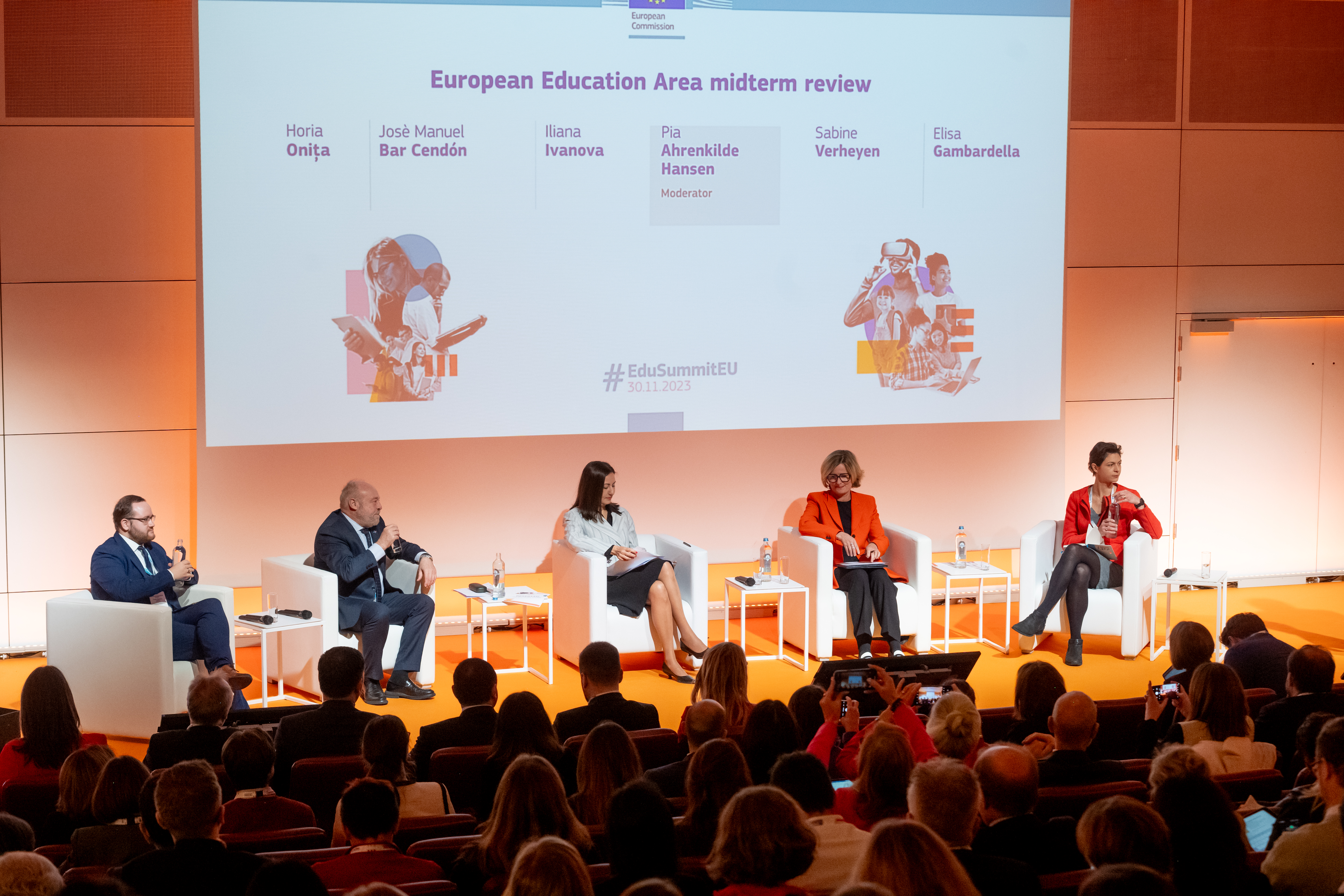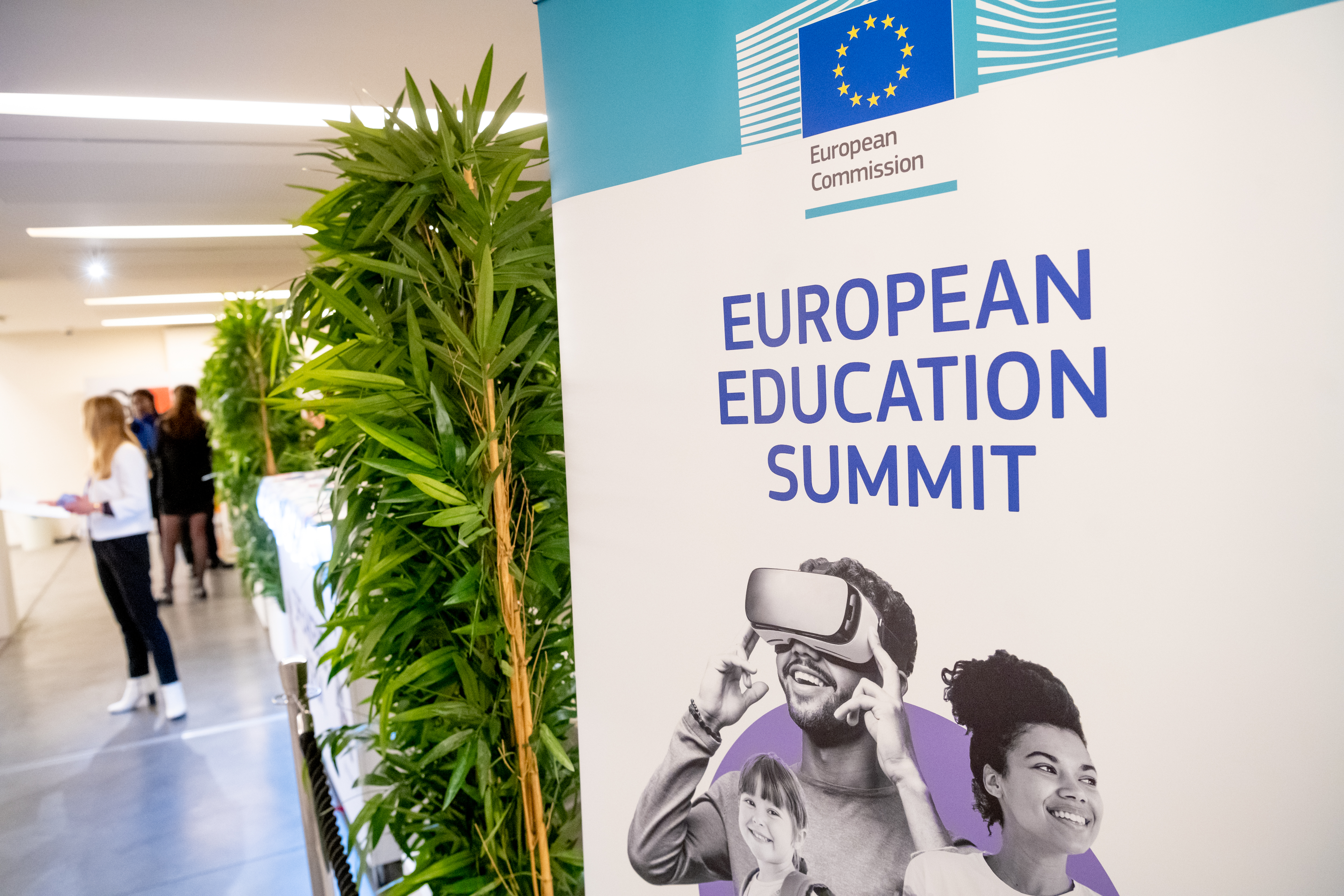European Education Area: A Reality for All
At the end of November the 6th European Education Summit took place. Have a look at the topics discussed.
This year's edition of the European Education Summit was subtitled "European Education Area: A Reality for All" and traditionally offered space for discussion, sharing of experiences and meetings of representatives of EU institutions, policymakers, representatives of associations, education experts and other relevant actors. The summit took place in the context of the ongoing mid-term evaluation of the European Education Area (EEA) and individual panel discussions and contributions focused on three main themes – improving the quality of education and training, investing effectively in education and training and equipping citizens with the skills needed for green and digital transformations.
In her opening speech, the European Commissioner for Innovation, Research, Culture, Education and Youth, Iliana Ivanova, emphasized the need for continued cooperation between all relevant actors at the European, national and regional levels and the sharing of experience not only within the educational community, but also with representatives of businesses, the labor market and other relevant actors. She also summarized the current state of the European Education Area and its set goals until 2025 and presented the remaining initiatives that the European Commission is working on. Recently, the Commission published the Skills and Talent Mobility Package, the main objective of which is to support the mobility of all as well as the labor market, especially in areas where Europe faces labor shortages. The package also includes a draft Recommendation on the mobility framework - Europe on the move, which will be discussed by the Council of the EU in the near future. The second package in the pipeline should be published next spring and will focus on the European Joint Degree, quality assurance and attractive and sustainable higher education careers. This package will be based, among other things, on the results of the "European Degree Label" pilot projects.
The Commissioner also presented two newly published reports. The 2022 Erasmus+ Annual report summarizes the impact of the Erasmus+ program in 2022, including the number of supported projects, the number of involved organizations or planned mobility of pupils, students, young people, teachers, youth workers and others. The report offers a view of the individual Member States as well as an overall overview at the EU level. The Education and Training Monitor 2023 analyzes EU education systems and the current state in relation to the set European goals. It focuses on the current situation in education at all levels, and this year also on how individual member states are doing in the area of the teaching profession (e.g. the aging of teachers, increasing the attractiveness of the teaching profession, access to teacher well-being, etc.).

EEA mid-term evaluation and support to the teachers
A panel discussion on the mid-term evaluation of the European Education Area took place between representatives of the European Commission, national ministries, students and also stakeholders. Together, they discussed current challenges and their possible solutions in the context of achieving the EEA by 2025 and its continued development until 2030. Support for inclusion and ensuring access to high-quality education for all, support for active citizenship and European values, and the importance of involving everyone, including students, young people, teachers and other stakeholders, in the creation of educational policies were emphasized.
Another of the panels focused on the topic of increasing the attractiveness of the teaching profession. Most Member States are currently facing teacher shortages, and the situation is expected to worsen over the next 10 years due to teacher retirements and a lack of young graduates choosing the teaching profession. To attract young people, it is important to combine and make visible the financial and non-financial incentives for the teaching profession, as well as to ensure sufficient support for the continued professional development of teachers at all levels (ensuring relevant and high-quality development opportunities, but also sufficient time in which teachers can take part in them and learn about new innovative methods, including artificial intelligence or how to work with diverse classrooms). Good practice examples that support teachers were also presented.
Artificial intelligence, the future of mobility, joint European degrees and other topics
The afternoon part of the summit was taken up by nine parallel panels. There was, for example, the topic of artificial intelligence (AI) and the future of education in this context. Among others, the Deputy Minister of Education Jiří Nantl spoke as part of this panel and emphasized that the role of teachers will continue to be irreplaceable and that AI can serve as an aid to teachers, but must not further deepen the digital divide. The panel focused on mobilities presented in more detail the above-mentioned draft Recommendation on the mobility framework, which is also based on the 21 recommendations of the citizen panel. As part of the debate on the European Joint Degrees, the speakers presented the advantages and previous experience with its implementation from the perspective of students, European Universities or ministries of education. Further discussions were devoted to pre-school education, investments in education, education for active citizenship and green transformation, the role of sport in comprehensive education or challenges in the Neighborhood East region.
At the end of the summit, Francoise Bertieaux, Minister for Higher Education, Scientific Research and Youth of the Francophone Community in Belgium, presented the priorities of the upcoming Belgian Presidency of the Council of the EU. In the next six months, Belgium will focus on the continued improvement of quality and equality in education and the development of the European Education Area. It will also focus on supporting evidence-based education, green and digital transformation and lifelong learning.
You can find more information on the event website, where recordings of individual parts of the summit are also available.
